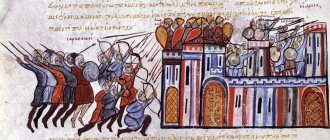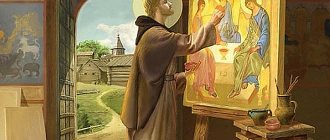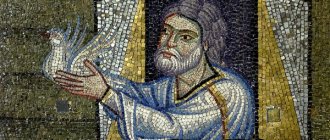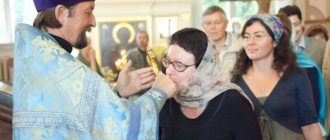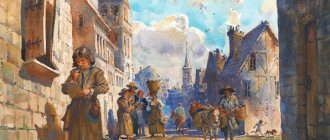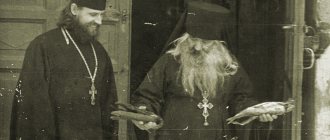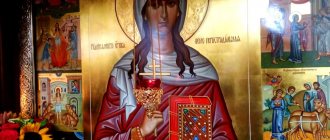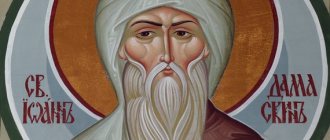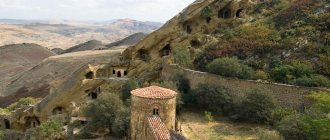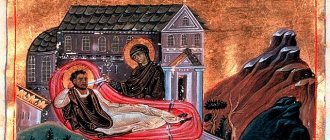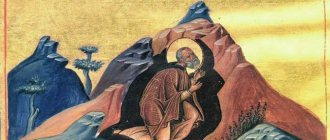The saint is called one of those who was involved in the creation of the Church, Her Father. The monk led a life full of ascetic charity and created Christian works that were beneficial to the spirit. Isaac the Syrian devoted his life to a solitary examination of his own soul, therefore his sublime teachings are filled with deep and insightful psychological information. He wrote about courts, spiritual administration, deanery, analyzed the state of righteousness and sin, and revealed to readers ways of self-improvement.
Brief history of the life of the saint
Little is known about the details of the life of this saint; various biographical data about his activities differ in detail. Until the 18th century, St. Isaac of Nineveh was often identified with other historical figures. The great Christian theologian was confused either with his namesake, who was engaged in polemics in the 5th century, or with a man who was fleeing persecution in Italy.
Venerable Isaac the Syrian, Bishop of Nineveh
Everyday facts about the venerable ascetic Isaac, claiming to be authentic, became known to society with the discovery of his biography in Arabic. However, the author of the biography used brief information in his work and did not give precise details about the birth and existence of Sirin.
Despite the paucity of facts, the source became for the Christian world the specimen that made it possible to identify the personality of the venerable ascetic in more detail.
- Isaac was born in the 6th century in the famous city of Nineveh, the capital of the Assyrian kingdom (modern Iraq). Even in his youth, he and his brother settled in the ancient monastery of Mar Matthaya, located on the peak of Mount Alfaf. The newly arrived inhabitants were distinguished by their ability to learn and their strength to cope with ascetic exercises for body and spirit. Brother Sirin was soon awarded the rank of abbot of the monastery, and Isaac decided to retire to a hermit’s cave in order to indulge in prayerful confession and silence.
- Saint Sirin did not doubt the truth of his choice, despite the fact that his relative sent him letters asking him to return to the monastery. Isaac answered: the path of asceticism is correct, since it allows you to concentrate on thoughts about God without interference, and also helps to get rid of unnecessary hesitation of a wandering mind.
- After a while, even people from the outskirts of the Assyrian state learned about the great hermit’s feat. The respected saints asked Isaac the Syrian to accept the position of Bishop of Nineveh. The venerable ascetic did not resist the will of the people and the priesthood; he relied on providence and accepted the rank of bishop. The ordination ritual was performed by Patriarch George.
ISAAC THE SIRIN
ISAAC THE SIRIN, Isaac of Nineveh [c. 640, Beth Qatrayah, Arabia (according to other sources, Nineveh) - approx. 700, mon. Rabban-Shabur (now Iran)], bishop, sire. spiritual writer, mystic, ascetic, Christian saint.
BRT Archive Isaac the Syrian. Miniature from “Words of the Fasting Isaac the Syrian.” Athos. Great Lavra. 1389. Russian State Library (Moscow).
Very little is known about the life of I.S.; basic The source of information about him is the “Book of Chastity” - the work of Sir. author of the 9th century Ishodenakha, bishop Basra, containing short lives of the Persian ascetics. Churches (Assyrian Church of the East). From early youth, together with his brother, he labored as a monk. Mar Matthew (near Nineveh), where he took monastic vows. Later he retired to the desert; how the ascetic gained great fame. OK. 660, at the insistence of the inhabitants of Nineveh, he was ordained bishop and placed in the Nineveh See. However, after 5 months he left the department, lived as a hermit on Mount Matut, and later - with mon. Rabban-Shabur on Mount Shushtar, where he spent the rest of his life.
Sire. sources indicate 5 or 7 volumes of works by I. S. 2 volumes of his works are known: the first became widespread, being translated into plural. languages of the world, the second was discovered only in 1983 by prof. S. Brock. The works from the 1st volume were translated into Greek by the monks of the Lavra of St. Sava the Sanctified in Palestine. language, translations were made from Greek into other languages, including into Slavic and then into Russian. “Ascetic instructions” (extracts) by I.S. were included in the “Philokalia”.
In “Chapters on Knowledge” (2nd volume) I.S. writes that God is the God of Love and Mercy, and not God the Judge, for mercy is incompatible with justice; justice gives everyone what he deserves, and mercy is sadness, inclined by grace to everyone with compassion: whoever is worthy of evil is not rewarded, and whoever is worthy of good is given doubly. When God punishes a person, He does it for the sake of his salvation. “A merciful heart” is an image of God’s mercy in man. The pinnacle of God's love for man is the Incarnation. The texts of the 1st volume testify to J.S.’s recognition of two natures in Christ. The study of the 2nd volume made it possible to provide a comprehensive analysis of Christological. views of I.S. He considers the economy of salvation to be a mystery that goes far beyond the limits of the human mind. According to J.S., Christ came to earth and suffered on the cross not for the sake of atonement for our sin and not for the destruction of death, but for the sake of the manifestation of God’s love for man (“Chapters on Knowledge”, IV, 84). Eschatological concepts follow from the doctrine of God-Love. views of I.S.: earthly life is a time of preparation for a future life, a time of growing up. The future life has no end or change (ibid., I, 19), bodily activity is replaced by mental activity (ibid., II, 8), enjoyment of beauty in the Kingdom of Heaven, beyond the Kingdom - fiery hell. Those tormented in Gehenna are struck by the scourge of love, for those who feel that they have sinned against the love of God endure great torment; the sadness that strikes their hearts is worse than any punishment (ibid., I, 18). The final fate of a person, I.S. believes, must be worthy of God’s mercy; he refers to Theodore of Mopsuestia and Diodorus of Tarsus, who taught that the torment of sinners is not endless, but their bliss after liberation is eternal. However, this is only an expression of a private theological opinion (theologumen), not included in the dogmatic. teaching of the Church.
A special place in the works of I.S. is occupied by various. aspects of monastic asceticism. practices.
Remembrance Day in Russia Orthodox Church (together with Ephraim the Syrian) - January 28 (February 10).
The further fate of the ascetic
Not all the inhabitants of Nineveh were pleased with the statements of their new bishop, since heavy passions caused by a vicious life had taken root in their souls. The people were completely unprepared to listen to the instructions of the venerable ascetic. The bishop's activities were accompanied by disobedience from the flock under his charge.
One day, a local lender demanded money from another person who had no way to repay the debt. Since they could not solve this problem quietly and peacefully, they had to refer this matter to Bishop Sirin. Reverend Isaac recalled that the Gospel teaches not only to defer debtors, but also to completely forgive debts if a person is unable to repay what he once took.
Icon of St. Isaac the Syrian
The disgruntled creditor criticized the bishop's speech; he declared that the Holy Scriptures were not his authority, since the instructions described there did not correspond to his material interests. The Reverend Bishop Isaac became indignant; the idea of leaving this difficult position finally took hold in his mind.
- Saint Sirin was the bishop of Nineveh for only five months; after many griefs, he abandoned his fast in order to retire from the material world to silent and deserted places. Some researchers claim that he went to Egypt, others - to a mountain located north of the Persian Gulf.
- After several years of living as a desert, the ascetic settled in the monastery of Rabban Ormizd. At the monastery, the Monk Isaac was engaged in spiritual practice, practicing prayer and work. Traditions say that he ate very little because he had taken a vow of severe fasting.
- The saint paid great attention to reading the Holy Scriptures and creating his own literary heritage. The compiler of the life notes that from constant and intense reading of books, the Monk Sirin completely lost his sight. However, even after this he did not stop creating manuscripts; his speeches were recorded by his assistant monks. Saint Isaac lived a long life and rested in the monastery of Rabbana-Ormizd.
Important!
Despite the fact that Sirin spent most of his life in cave seclusion, his literary works have a universal purpose. These writings and instructions are useful not only for hermits, but also for monks living in monasteries, as well as for laypeople who have faith in the teachings of Christ. The monk reveals the essence of the stages of spiritual achievement and the power of a contemplative lifestyle. Reading his “Ascetic Words” brings spiritual satisfaction and can inspire religious achievements. Like other ascetic theologians, Sirin thoroughly reveals to readers the essence of the hermit lifestyle.
Venerable Isaac the Syrian and the works of F. M. Dostoevsky
My area of research is Russian literature. About St. I learned about Isaac the Syrian through the novels and notes of Fyodor Dostoevsky. Studying the function of biblical quotations in the works of this writer, I realized that they contain many direct or indirect quotations from the fathers of the Eastern Church[1], especially from the “Words of the Ascetics” of St. Isaac the Syrian.
Other Russian writers before Dostoevsky were also inspired by patristic texts. The poetic retelling of the prayer of St. Petersburg is well known. Ephraim the Syrian in Pushkin and the influence of St. John Climacus on the work of Gogol. In my opinion, Dostoevsky goes much further than these writers. Dostoevsky's meeting with the thought of St. Petersburg, which was very close to him. Isaac - bright, hot, reflecting love - allowed me to more clearly comprehend what was then a deep, but still instinctive feeling in him.
In my opinion, the significance of Dostoevsky for the dissemination of the thought of St. Isaac the Syrian is great in Russia and the West. Through the novels of this writer, some of the main themes of the book of St. Isaac has reached and still reaches a wide audience, which is often unaware of the very existence of this Father of the Church.
Among Dostoevsky's many readers, some were able not only to understand his thought, but also to develop it in their personal lives. In my article “Dostoevsky and the Theological Turning Points of the 1900s”[2], I highlight the influence of the Russian writer’s novels on Barthes, Thurneysen and Bonhoeffer, which they often openly acknowledged. It is worth mentioning that Dostoevsky's themes developed by these theologians are the same themes that the Russian writer drew from the book of St. Isaac the Syrian.
One date is noteworthy in Dostoevsky’s artistic and creative life: December 28, 1865.[3] It is noted on the page in the notebook in which he wrote the third draft of Crime and Punishment and where there is a note:
IDEA OF THE NOVEL: 1) ORTHODOX VIEW, WHAT IS ORTHODOXY. There is no happiness in comfort; happiness is bought through suffering. This is the law of our planet, but this direct consciousness, felt by the everyday process, is such a great joy, for which you can pay for years of suffering. Man is not born for happiness. A person deserves happiness, and always suffering. There is no injustice here, because vital knowledge and consciousness are acquired by experience pro and contra, which must be carried on oneself[4].
Dostoevsky's words about happiness, which is bought at a great price and therefore much more expensive, were written by a man who had already survived a suspended death sentence in 1865, four years in a penal colony in Siberia, frequent short deaths from epilepsy, and desperate loneliness after the death of his first wife and the death of brother Mikhail, which occurred a few months later, in 1864.
This paragraph in the notebook concisely expresses in a few lines one of the paths recommended by the fathers of the Eastern Church for achieving the “kingdom of God” in oneself, that is, a state of joy enlightened by the mercy of God.
We know that according to the list compiled by Anna Grigorievna after the death of her husband, among Dostoevsky’s books was the 1858 edition of “Ascetic Words.”[5] and that in his drafts and in the final text of The Brothers Karamazov, St. Isaac the Syrian has been quoted many times. Dated December 28, the explanation of “what the Orthodox view is” is very close to the understanding expressed by St. Isaac[6]:
“No one ascended to heaven living a cool life. As for the cool path, we know where it ends.”[7]
“Do not turn away from sorrows, because through them you enter into the knowledge of the truth; and do not be afraid of temptations, because through them you gain what is worthy.”[8]
“...The heart, until it humbles itself, cannot stop soaring; humility brings it together... then a person... with heartfelt joy and surprise constantly exudes grateful movements”[9].
In my opinion, the influence of St. Isaac is present in Dostoevsky's works starting from Crime and Punishment. The first epiphany in Crime and Punishment occurs in the tavern where Marmeladov and Raskolnikov meet. I quote this episode because the writer inserted into it one of the most significant and clearly paradoxical statements of St. Isaac the Syrian. It is also important to remember how much attention Eduard Turneisen devoted to Marmeladov’s monologue in the book “Dostoevsky” (1921), and about his interpretation of this passage, which influenced Karl Barth when writing “The Epistle to the Romans.” I'll come back to this later.
Marmeladov's speech is one of the most spiritually daring texts written by Dostoevsky. It is pronounced by a person who has sunk to the very bottom of society and no longer enjoys the respect and trust of others. On first reading it may be mistaken for the last illusion of a desperate man who creates an image of God to suit his own needs. Nevertheless, his words are confirmed by biblical quotations given by this character. They convey a clear theological thought, which, I think, Dostoevsky at that time could understand and recognize, but could hardly develop with such brilliance.
The character, who no longer expects anything from people, finds the strength to look up in search of help and find a “secret” that remains hidden from the powerful and “righteous” of this world:
And he will judge and forgive everyone, both the good and the evil, the wise and the humble... And when he has finished with everyone, then he will say to us: “Come out,” he will say, you too! Come out drunk, come out weak, come out drunk!” And we will all go out without shame and stand. And he will say: “You pigs! the image of the beast and its seal; but come too!” And the wise will say, the wise will say: “Lord! Why do you accept these?” And he will say: “That is why I accept them, the wise ones, because I accept them, the wise ones, because not one of these himself considered himself worthy of this...” And he will stretch out his hand to us, and we will fall down... and weep... and we will understand everything!.. Lord, thy kingdom come![10]
It is important to emphasize that this speech, delivered in a tavern by a man who feels deeply guilty and unworthy, contains the same idea that St. Isaac the Syrian expressed this in the 90th Word, based on the same quotations from the Gospel. When Marmeladov says: “And he will judge and forgive everyone, both good and evil,” he is implicitly referring to Luke 6:35: “But love your enemies, and do good, and lend, expecting nothing; and you will have a great reward, and you will be sons of the Most High; for He is kind to the ungrateful and the wicked.” And the Lord’s answer to the objection of an honest and wise man is consistent with the second part of the parable of the workers sent into the vineyard in Matthew 20:8–15.
Now I quote a passage from St. Isaac the Syrian, where two quotes follow in the same order:
Be a preacher of the goodness of God, because God feeds you, who is unworthy... Do not call God just, for His justice is not known by your deeds... but His Son revealed to us that He is even more good and gracious. For he says, “It is good” for the wicked and the wicked (Luke 6:35). And why do you call God just, when in the chapter about the reward of workers you read: “I will not offend you, my friend... I want to give to this last one, as I would to you.” Even if your eye is evil, because I am good” (Matthew 20:13–15)? Why also does a person call God just when he sees the chapter about the prodigal son? <…> Where is God’s justice? Is it that we are sinners, but Christ died for us?[11]
Here Rev. Isaac insists that God is unjust, or better yet, that he does not follow human justice. This is a bold view, but also well based on quotations from the Gospel. In the Russian edition of the text of St. Isaac, translated from Greek, this speech is placed at the end of the book, where the path of purification described by the author is completed and an internal state of deep joy and great love is achieved. Many chapters of “Ascetic Words” are devoted to the hermit life, constant prayer, asceticism and spiritual exercises of monks. But St. Isaac also considers another path - the path that Dostoevsky’s favorite heroes have taken since Crime and Punishment:
Blessed is the man who recognizes his weakness... As soon as someone recognizes and actually feels his weakness, he lifts up his soul from the relaxation that darkens this knowledge... Therefore, the heart, until it humbles itself, cannot stop soaring; humility brings it together. And as soon as a person humbles himself, mercy immediately surrounds him... All these benefits are born to a person from the knowledge of his own weakness. For through a great desire for God’s help, he approaches God... And to the extent that he approaches God with his intention, to the extent that God approaches him with His gifts...[12]
This is exactly the experience that Marmeladov and Sonya had. This experience attracted the attention of Thurneysen, who at one point in his book anticipates some of the central concepts expressed by Barth in his Epistle to the Romans:
Love of God is humility, so aware of itself and its desires that it no longer questions or makes claims. This is such a strong thirst that has already passed the test of its fullness and therefore no longer needs relief, quenching... According to God’s plan, those who love Him must fulfill what no person can impose on himself or on any other person. In what other way would someone who loves God know this? How could he congratulate himself on having turned the key, opened the door, performed the negation of the negation, walked the narrow path between two abysses, changed the un-edifying signs scattered everywhere, undertook the overthrow of all things?.. Those who love God are destined to be witnesses of Christ via crucis and therefore - His resurrection. Their way of life is the most difficult, extreme experience, no matter what form it takes[13].
This is a path that Barth probably already knew before writing his book in 1922, not from direct experience, but from the stories of Dostoevsky's main characters, which he quotes repeatedly in his book (especially the story of Ivan Karamazov). In Introduction to Evangelical Theology, Barth recalls that at that time he and Thurneysen were “reading a lot of Dostoevsky (and in this reading I was guided by Thurneysen).”[14] In Dostoevsky's novels, the path on which God acts and helps requires from Sonya, Raskolnikov, Mitya, Markel and other characters a painful process leading to an awareness of their own weakness and helplessness. This awareness deprives them of all illusions and encourages them to “walk the narrow path between two abysses” of which Barthes speaks: the first abyss is a capitulation to the destructive forces that they feel within themselves[15], and the second is a capitulation to an unknown, capable to overthrow the “un-edifying signs scattered everywhere” and lead to a new view of the world.
The central motif of Dostoevsky’s work is “heaven on earth.” The paradise that characters such as Zosima, Kirillov and the “mysterious guest” talk about is located neither in space nor in time. This is an inner dimension achieved through gradual purification or - as the elders and fathers of the Church emphasize - sudden acute suffering caused by the death of the former self, its attachments and desires. In this regard, the episode of Markel, a terminally ill young man, brother of Elder Zosima, in The Brothers Karamazov plays an important role:
Life is paradise, and we are all in paradise, but we don’t want to know it, but if we wanted to know, tomorrow there would be paradise in the whole world... My dears, why are we quarreling, boasting to each other, remembering each other’s grievances... Let us begin to love and praise each other, and kiss, and bless our lives[16].
Markel’s speech contains two key sentences: “Life is paradise” and “Each of us is to blame for everything before everyone else.” These two insights are combined not only in the memory of Zosima, but also in the highest and most significant texts of Orthodox spirituality, which describe the paths leading to the achievement of the “Kingdom” in oneself.
The boy’s “strange and decisive” tone, when he suddenly proclaims his unusual truths, his trepidation, together with love, feeling, joy, show that he has opened a completely new view of the world, of himself, of life.
“I’m not crying out of grief; I myself want to feel guilty before them, but I can’t explain it to you, because I don’t know how to love them. Even though I am a sinner before everyone (the birds chirping outside the windows), but for that everyone will forgive me, that’s paradise. Am I not in heaven now?[17]
This is the same feeling that St. spoke about. Isaac the Syrian, when he described the experience of the “Kingdom” in himself:
“When he reaches the knowledge of the truth, after the sensation of the mysteries of God is aroused in him... then he is absorbed in love... When I wrote this, my fingers repeatedly stopped at the charter, and I could not endure the sweetness that invaded my heart and silenced the feelings... Love is the product of knowledge..."[18]
“They say about the Kingdom of Heaven that it is spiritual contemplation. And it is not acquired by the works of thoughts, but can be tasted by grace. And until a person purifies himself, he does not have sufficient strength to even hear about it, because no one can acquire it by studying it.”[19]
“Repentance is the second grace, and is born in the heart from faith and fear; fear is the fatherly rod that controls us until we reach the spiritual paradise of blessings; and when we reach it, then he will leave us and return. Paradise is the love of God..."[20]
“Make peace with yourself, and heaven and earth will make peace with you. Strive to enter your inner cage, and you will see the heavenly cage, because both are one and the same, and when you enter one, you see both. The ladder of this Kingdom is within you, hidden in your soul. Immerse yourself in yourself from sin, and you will find there ascents along which you will be able to climb”[21].
This enormous love, limitless in the deepest sense of the word, coming from the comprehension of the divine in oneself, St. Isaac dedicated his most vivid speeches, in which he was able to embrace all living things, without exception, as in a single body, including the most unpleasant and disgusting:
“And what is a merciful heart?” - and said: “A person’s heart is kindled about all creation, about people, about birds, about animals, about demons and about every creature. When remembering them and looking at them, a person’s eyes shed tears. Out of great and strong pity that envelops the heart... and for the dumb, and for the enemies of the truth, and for those who do harm to him, every hour he brings a prayer with tears that they will be preserved and have mercy; and also for the nature of reptiles he prays with great pity, which is immeasurably aroused in his heart until he becomes like God in this”[22].
This enormous love, which allows us to identify with everyone and everything, causes repentance and is defined by St. Isaac as “the trembling of the soul before the gates of Heaven.”
Markel experiences the same thing when he experiences guilt, not fruitless, but the beginning of a path leading to love and boundless gratitude. He says that he “cries from joy, not from pain” and that he “asks for forgiveness even from the birds” because he loves all living things with a love so great that he does not know how to express it.
From this episode onwards, the experience of suffering - which Ivan rejects just as the Inquisitor destroys the cross - takes on a different meaning. And Dostoevsky, etc. Isaac agree that there are two ways in which one can remove the blinders from the eyes: the path of a monk who leaves the world, and also the trauma caused by acute suffering, which humbles a person and exposes him to God. This is Markel's condition in his last days.
The experiences of Dostoevsky’s main characters, who act under the pressure of an urgent need for light, flow in the same direction. All the characters in his latest novels, even the most desperate and guilty, are aimed at this state of joy and inner satisfaction.
Elder Zosima, who, remembering Markel, reveals his spiritual will, is inspired in almost every statement of his long speech by the “Ascetic Words” of St. Isaac the Syrian. I will limit myself to quoting a few short passages, the sources of which are easily determined by those who are familiar with the text of St. Isaac:
“Remember especially that you cannot be anyone’s judge. For there cannot be a judge of a criminal on earth until this judge himself recognizes that he is just as much a criminal as the one standing before him... Crazy as it may seem, this is true. For if I myself were righteous, perhaps there would not be a criminal standing before me.”
“Brothers, do not be afraid of the sin of people, love a person even in his sin, for this likeness of divine love is the height of love on earth.”
“What is hell? I reason like this: Suffering because one can no longer love... this torment is not external, but inside them. And even if it were possible to take it away, then, I think, it would make them even more miserable, because it would arouse in them an even stronger flame of thirst for reciprocal, active and grateful love, which is no longer possible.”[23]
Zosima's speech deeply moved Eduard Thurneysen, who, in the chapter of his book “The Humble, Not the Saints,” regrets that he cannot fully quote the “amazing” words of the elder:
I will refrain from quoting any further from them. You have to quote everything if you really want to quote. But one more thing must be said as a warning: do not borrow the amazing words of this monk hastily, easily, or with too much confidence. They (like the words of the Bible and for the same reason!) can lose their power in our hands and in our mouths. Because we easily forget that in this case, hosanna breaks out only from the purgatory of the most terrible temptations, that words of gratitude come from a suffering heart and that love for man and for the world is achieved only through streams of tears[24].
Being in agreement with St. Isaac (“Do not give up sorrows, because through them you enter into the knowledge of the truth, and do not be afraid of temptations, because through them you gain what is worthy; “the heart, until it is humbled, cannot stop soaring”), Thurneysen is right when he warns us from superficial and transitory enthusiasm for seemingly easy and attractive speech. Dostoevsky himself emphasizes in his novels and notes that in order to deeply understand the words of Zosima, it is necessary to experience suffering, which brings us to our knees, depriving the experiencer of the illusions that lie at the very core of the existence of most people.
My article “Dostoevsky and the Theological Turning Points of the 1900s” is devoted to a detailed analysis of the influence that the thought of Dostoevsky et al. Isaac the Syrian influenced the theology of Thurneysen, Barth and Bonhoeffer. It is incredible, but I think it is quite possible[25], that these theologians were directly familiar with the thought of St. Isaac the Syrian. Nevertheless, there are common substantive points in the interpretation of the Bible by them and this father of the Church. I believe that these coincidences can be explained as follows.
In the 7th century St. Isaac the Syrian, having chosen to live in freedom, far from the centers of culture and power[26], could devote every day of his life to the study of Scripture. The interpretation offered in his book is accompanied by a large number of quotations and demonstrates the knowledge acquired by a lifetime of work. St. Isaac was able to understand and express the great potential for love contained in the Bible - which makes anthologies of his work attractive - as well as the radicalism of the Bible, so unpleasant and disturbing to the sober, righteous and pious. This is true both in relation to the speech of Zosima (written more than a thousand years later)[27], and in the very recent books of Barthes, Thurneysen, Bonhoeffer.
The richness and spiritual depth that these turning point theologians find in Dostoevsky's works is undoubtedly due to his writing talent and difficult life experiences, but also to his frequent reflections on the Bible, filtered through the "filter" of St. Isaac the Syrian.
Similarities between an early Christian commentator on Scripture, a Russian writer, and the authors of an important turning point in 20th-century theological thought. encourages us to think about an important aspect of exegesis. The text of the Bible expresses its entire revolutionary message of love between God, Christ and man - a love difficult for both sides - only to those who, in any era, find the courage to refuse compromises and resist those who are content with the superficial meaning of the Holy Scriptures and close their eyes to the tearing contradictions realities that would seem to refute the biblical gospel.
We must give credit to Thorneisen, Barth, and Bonhoeffer for not turning a blind eye during the darkest and most dangerous times in the history of theology, the Church, and the world. More than a thousand years later, the thought of St. Isaac came to them through the works of Dostoevsky and helped in their work.
The books of a seventh-century Church father, a Russian writer and three theologians from different angles bear witness to perfect faith in God and a deep understanding of the most difficult passages of Scripture. This was and remains extremely important not only for those who lived through Auschwitz or events such as in the life of the Russian author, but, I believe, even today for all those who are ready to see the contradictions, cruel injustice and greed of our time.
Simonetta Salvestroni's report was read on October 11, 2013 at the international conference of the All-Church Postgraduate and Doctoral Studies “St. Isaac the Syrian and his spiritual heritage.” All reports presented at this conference are published in a separate collection. The circulation of this collection has ended, but it is available in electronic form on liters.
[1] There are no studies on the influence of the fathers of the Eastern Church on the works of Dostoevsky. Hints of the problem can be found in Evdokimov’s articles, in particular in his article “Gogol and Dostoevsky, or the Descent into Hell” (Gogol et Dostoïevsky, ou La descente aux enfers. P., 1961), and in some articles by modern Russian writers.
[2] Salvestroni S. Dostoevskij e le svolte teologiche del '900 // Protestantesimo. 2000. N 3. P. 168–204.
[3] Salvestroni S. Dostoevskij e la Bibbia. Biella, 2000 (Russian translation: Biblical and patristic sources of Dostoevsky’s novels. St. Petersburg, 2001).
[4] Dostoevsky F. M. Complete. collection Op.: In 30 volumes. L., 1972–1988. T. 7. pp. 154–155.
[5] Wed: Grossman L.P. Seminary on Dostoevsky. M., 1922.
[6] Quotes are given from the edition: Abba Isaac the Syrian Words of Asceticism / Ed. S.I. Sobolevsky. Sergiev Posad, 1911. M., 1998.
[7] Word 35. P. 152.
[8] Word 5. P. 28.
[9] Word 61. P. 334.
[10] Dostoevsky F. M. Crime and punishment // Ibid. T. 6. P. 21.
[11] Word 90. pp. 430–431.
[12] Word 61. pp. 333–335.
[13] Barth K. Der Römerbrief. Munich, 1922; it. Transl.: L'epistola ai Romani. Milano, 1962, pp. 302–305.
[14] Barth K. Einführung in die evangelische Theologie. Zurich, 1962; Italian translation: Introduzione alla teologia evangelica. Cinisello Balsamo, 1990. P. 245.
[15] Dostoevsky, like Barthes, understood well that even borderline experience does not guarantee salvation. This is proven by the stories of Ippolit, who dies unhappy, Kirillov and Stavrogin, who capitulated to self-destruction to the point of committing suicide, and other characters whose lives ended tragically.
[16] Dostoevsky F. M. The Brothers Karamazov // Ibid. 1972–1988 T. 14. P. 262.
[17] Ibid. P. 263.
[18] Word 38. pp. 159–160.
[19] Word 49. P. 217.
[20] Word 83. P. 397.
[21] Word 2. P. 10.
[22] Word 48. pp. 205–206.
[23] Dostoevsky F. M. The Brothers Karamazov // Ibid. pp. 289–293.
[24] Thurneysen E., Dostojewski. Roma, 1929. P. 91 (first German edition - 1921).
[25] Anthology of translations of the works of St. Isaac the Syrian into German has been available since 1874: Bickell G. Ausgewählte Schriften der syrischen Kirchenväter Aphraates, Rabulas und Isaak von Ninive, zum ersten Male aus dem Syrischen übersetzt. Kempten, 1874 (Bibliothek der Kirchenväter, 63). I owe this link to Sabino Kyala.
[26] As is well known, Rev. Isaac was consecrated bishop of Nineveh, but after five months he left the see and went to live with the anchorites on Mount Matut. From there he reached the monastery of Rabbana Shabura, where he died in old age, after becoming blind due to constant and prolonged reading of the Holy Scriptures.
[27] Compare: Salvestroni. Dostoevskij e la Bibbia. 2000. P. 217.
Creative heritage
Researchers do not have the exact number of all the books compiled by Saint Isaac. But even those that we know today speak of the author as a person of high education and spiritual maturity. The Monk Sirin considers a wide range of religious issues.
His works reveal the essence of dogmatic truths and illuminate monastic instructions; in the books the reader finds psychological observations revealed by the author through the experience of spiritual experiences and personal communication with the Lord.
- The theological work of the saint from Nineveh is distinguished by a clear connection between moral edifications in asceticism and their practical application in life.
- When the author talks about the One Lord, he does not forget to reveal the benefits of constant mental contemplation of the Lord. The saint shows the mental connection between Christian virtues that lead the soul to purification and the properties of the Supreme Creator, who is perfection.
Books by Isaac the Syrian - Speaking in his writings about heavenly messengers, the author demonstrates the role of angels in personal improvement. Mentioning demons, he brings them into the open, reveals the means that the dark forces use, and also clarifies how they use deceit and lies for their own selfish purposes.
- According to the Monk Isaac the Syrian, the most important thing in achieving the highest peace is acquiring sensual dispassion. Here he makes a clarification: passions do not need to be made alien to a person, but they should be abandoned as such, that is, ignored.
- The saint recommended that we take even the slightest manifestations of sinfulness, which are often called minor, seriously, since indulging them soon leads to the growth of spiritual depravity.
- Isaac the Syrian stated: “Patience is the ancestor of consolation and a powerful mental force arising from the breadth and depth of the heart.” It is difficult for a person to obtain this treasure in a world full of suffering without directly turning to Almighty God through prayer. You shouldn’t grumble about your fate; you need to find the means that will help you become more patient and merciful towards your surroundings.
- The Monk Sirin said that prayer becomes the care of our consciousness for God and any reflection on righteous spirituality. The person praying has no right to harbor anger, envy or any other negative quality, because then the practice will not give any result, just as seeds do not sprout in the sea.
- The love of the Lord is expressed in Paradise, where there is the enjoyment of bliss, which is also the Tree of Life, which the progenitor Adam abandoned. The soul that loves God is in Him and finds peace forever. However, love generated by an external object fades and disappears when this object disappears, dies.
Important!
The works of St. Sirin of Nineveh are held in tremendous esteem among Orthodox ascetics. The Christian writer P. Damascene actively refers to the manuscripts of St. Isaac in his works. Nilus of Sorsky, in his main work, often notes ideas and excerpts from the books of St. Sirin. And Bishop Theophan (Vyshensky) even composed a prayer addressed to the venerable ascetic.
